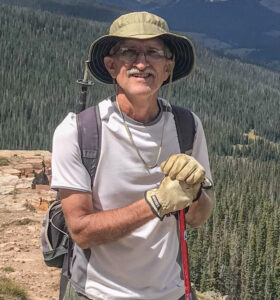
By DEACON MIKE SEIBERT
CONNECTING FAITH AND LIFE
The first words of Jesus in John’s Gospel are, “Come and you will see;” but I recently heard that the more direct translation would be “Come and become one who sees.” Maybe not earth-shaking, but that nuance opened my eyes to see things that have been hidden in plain sight all my life.
My favorite pastime lately has been leading small groups through a study of The Chosen series. It’s like a treasure hunt, as everyone in the group studies each scene – each conversation – each phrase, looking for the deeper meaning. It’s that deeper meaning that is the hidden treasure. Some things are hidden in plain sight, so that even the casual viewer will get the message. But many things are hidden below the surface – and finding that meaning is exciting – and that excitement is what can draw people to want to understand more about their faith.
For example, the series teaches us that the Jewish people would pray this prayer before they drank: “Blessed are you Lord God, king of the universe, who brings forth the fruit of the vine.” First, that sounds an awful lot like what we hear in the beginning of the Eucharistic Prayer at Mass – which helps us to see how Catholicism is, in many ways, a continuation and perfecting of the Jewish faith and rituals. Second, in the episode about the miracle at Cana, that prayer, which basically declares that God himself is the one who brings forth the wine – that prayer is a prophecy of what we actually see happen in that episode as Jesus brings forth wine in abundance.
One of my favorite episodes is Season 2, Episode 3. Remember the reading where Nathaneal first meets Jesus? Jesus said, “I saw you under the fig tree.” And Nathaneal’s response is, “You are the King of Israel!” Have you ever wondered how he made that sudden leap to a conclusion based on one statement from Jesus about seeing him under the tree? Well, without giving it away, I’ll say the writers wrote an amazing, plausible back-story, which helps that conversation make perfect sense. In fact, any one of us would have made the same declaration as Nathaneal if we had been in his shoes.
I love watching my fellow studiers as their eyes gradually open to see the deeper meanings for themselves. Once our eyes are opened to the existence of the hidden treasure, we all start looking for it everywhere – and we find it everywhere! We become one who sees!
One last example; as we neared the end of Season 2, we heard the quote from Jesus that “Sabbath was made for Man, not Man for the sabbath.” Does that make sense to you? The first part seems sort of simple – something like, “God made Sundays so we would rest;” but how does the second part make sense? It’s one of those ‘riddles’ that we just sort of gloss over our whole lives because we guess there must be meaning there since Jesus said it, but it just sounds, well…, like a riddle.
In our most recent study, we discussed that phrase; and we think we came up with a way to make more sense by adding just a couple of words. See what you think: “The Sabbath was made to make man holy, man was not made to make Sabbath holy.” In other words, it’s not our actions that make the Sabbath a holy day, but it’s our observance of the Sabbath that allows God to make us holy! To be holy means to be set apart. We don’t make Sunday a holy day; God set that day apart. God made Sunday holy so that you and I can be holy; so that WE can be set apart (i.e. different than other people).
OK, maybe that seems basic to everyone reading this; but to the folks in my study group, this was quite a revelation – a nugget of gold we uncovered just because we took the time out of our busy schedule to ask questions and allow God to open our eyes so we could become one who sees.
Deacon Mike Seibert serves at St. Isidore the Farmer Parish, which includes St. Celestine Church in Celestine and St. Raphael Church in Dubois.
